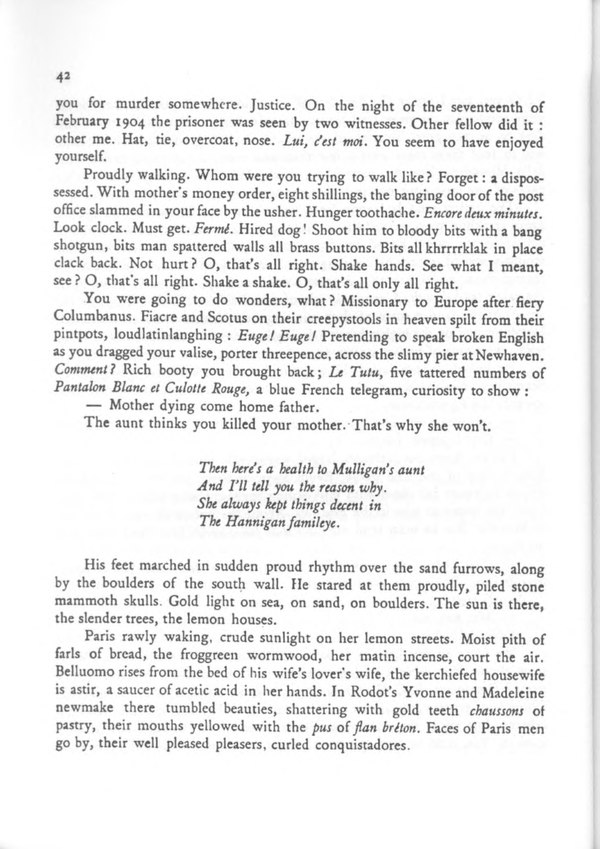Annotations to James Joyce's Ulysses/Proteus/042

Annotations
[edit | edit source]Lui, c'est moi (French) I am he.[1] Stephen's statement is a parody of the oft-quoted remark attributed to Louis XIV of France: L'état, c'est moi (I am the state).
Encore deux minutes. Look clock. Must get. Fermé (French) Still two minutes to go ... Closed.[2] Stephen is recalling an incident when he tried to cash a money order from his mother at a French post-office. When the door was closed in his face, he pleaded with the usher in broken French and English: There are still two minutes to go [before closing time]. Look [at the] clock. [I] must get [this money order cashed]. To which the usher replied: [We're] closed.
Euge! Euge! (Latin) Well done! Well done![3]
In the Latin Vulgate translation of the Bible, this interjection is always used ironically by a mocker, as is clearly intended here. English versions usually translate the original Hebrew as Aha or Ah:
- Ezekiel 25:3 et dices filiis Ammon audite verbum Domini Dei haec dicit Dominus Deus pro eo quod dixisti euge euge super sanctuarium meum quia pollutum est et super terram Israhel quoniam desolata est et super domum Iuda quoniam ducti sunt in captivitatem[4]
- Ezekiel 25:3 And say unto the Ammonites, Hear the word of the Lord GOD; Thus saith the Lord GOD; Because thou saidst, Aha, against my sanctuary, when it was profaned; and against the land of Israel, when it was desolate; and against the house of Judah, when they went into captivity;[5]
The original Hebrew word is heach.[6]
Comment (French) What?[7] At Newhaven in England, on his way to Paris, Stephen pretended he was French and could not speak English in order to avoid having to pay a porter threepence to carry his valise.
Le Tutu (French) A tutu is a short ballet skirt.[8] Le Tutu was a humorous weekly magazine that first appeared in Paris on 25 March 1901.
Pantalon Blanc et Culotte Rouge (French) White Knickers and Red Panties.[9] No such periodical is known, though the second half of the name recalls a genuine French magazine, La Vie en Culotte Rouge (Life in Red Breeches, or Among the Camp Followers).[10] It has been suggested that Joyce concocted the title so as to strengthen the link between Stephen and Bloom, for whom women's undergarments are a fetish. See 070.33 - 071.37, and of course Nausicaa.
Paris rawly waking, crude sunlight on her lemon streets. Moist pith of farls of bread, the froggreen wormwood, her matin incense, court the air. Belluomo rises from the bed of his wife's lover's wife, the kerchiefed housewife is astir, a saucer of acetic acid in her hand. For this description of early morning in Paris, Joyce drew heavily upon his unpublished prose poem Giacomo Joyce, where it is Trieste that is being described:
Trieste is waking rawly: raw sunlight over its huddled browntiled roofs, testudoform; a multitude of prostrate bugs awwait a national deliverance. Belluomo rises from the bed of his wife's lover's wife: the busy housewife is astir, sloe-eyed, a saucer of acetic acid in her hand.....
Belluomo (Italian) Handsome man.[11] The Italian makes sense in the context of Trieste (see above).
chaussons (French) turnovers.[12] A chausson is a turnover made, usually, with puff pastry and a fruit filling. Chaussons aux pommes are apple turnovers.
pus (French) pus.[13] Pus is a viscous yellowish liquid associated with bacterial infections (e.g. pimples). Stephen is referring to the yellow custard in a flan bréton.
flan bréton (French) custard tart.[14] In French flan denotes a baked custard tart. The variety of custard tart associated with Brittany is called a Far Breton. But Stephen's reference to the yellow pus of the custard suggests that he has some sort of custard pastry in mind in which the custard is not set, such as a mille-feuille.
Breton, without the acute accent on the e, is the correct spelling. In The Little Review, which published an early draft of this episode in 1918, the word was spelt brêton.[15]
conquistadores (French Slang) lady-killers.[16] Conquistadores is a Spanish word for the soldiers, explorers and adventurers who conquered and colonized the territories that created the Spanish Empire in the 15th-17th centuries; but the term is also used in several European languages to describe a lothario.
References
[edit | edit source]- ↑ Gifford (1988) 53.
Thornton (1968) 51-52. - ↑ Gifford (1988) 53.
- ↑ Gifford, Don; Seidman, Robert J. (1988). Ulysses Annotated. University of California Press. p. 54.
Thornton, Weldon (1968). Allusions in Ulysses. The University of North Carolina Press. p. 52. - ↑ Bible Gateway
- ↑ Bible Gateway
- ↑ Strong's Hebrew
- ↑ Gifford (1988) 54.
- ↑ Gifford (1988) 54.
Thornton (1968) 52-53. - ↑ Gifford (1988) 54.
Thornton (1968) 53. - ↑ La Vie en Culotte Rouge. Culotte rouge is also French slang for a camp follower.
- ↑ Gifford (1988) 54.
- ↑ Gifford (1988) 54.
- ↑ Gifford (1988) 54.
- ↑ Gifford (1988) 54.
- ↑ The Little Review 5:1:37.
- ↑ Gifford (1988) 54.
